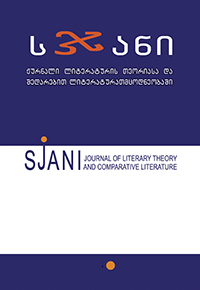საბჭოთა იდენტობის პოლიტიკა და საბავშვო მხატვრული ლიტერატურა (ლ. ლაგინის „მოხუცი ხოტაბიჩის“ მაგალითზე)
Soviet Identity Politics and Children’s Literature (Based on L. Lagin’s “Old Man Khottabych”)
Author(s): Namgaladze TamarSubject(s): Language and Literature Studies, Cultural history, Russian Literature, Politics and society, History of Communism, Theory of Literature, Identity of Collectives
Published by: ლიტერატურის ინსტიტუტის გამომცემლობა
Keywords: Soviet ideology; identity politics; children’s literature;
Summary/Abstract: Research of identity politics is an important topic. Meaning of a such research increases when identity politics is controlled by specific ideologies. Identity politics of Soviet Union was aimed on forming and shaping of a new type of person – Homo Sovieticus. The most important group for manipulations were children. Literature was one of the ways of such influence, therefore, the information given to a child was carefully controlled and defined by ideology. Studying the children’s books of Soviet period may give us some valuable information about the methods and topics of influence used for forming and shaping the Soviet Identity. Comparing the different editions of the same book gives us the most interesting information. In this paper we are comparing two editions of the L. Lagin’s “Old man Khottabych”. The goal of the research is to underline differences between the original (1938) and the edited version (1955) of the book, to highlight the topics and the methods of influence. We used narrative analysis as a method of research and structuralism as a framework. The importance of the study is defined by the essence of identity politics – forming and shaping identity is a crucial part of any society. As a result of the research we can define two major groups of differences – characters (types of pioneers; Soviet civilians; image of enemy) and plot (life in Soviet Union; attitude towards past and religion; international relationships). In this article we discuss only first group of differences – differences about characters.
Journal: სჯანი
- Issue Year: 2022
- Issue No: 23
- Page Range: 148-163
- Page Count: 18
- Language: Georgian

